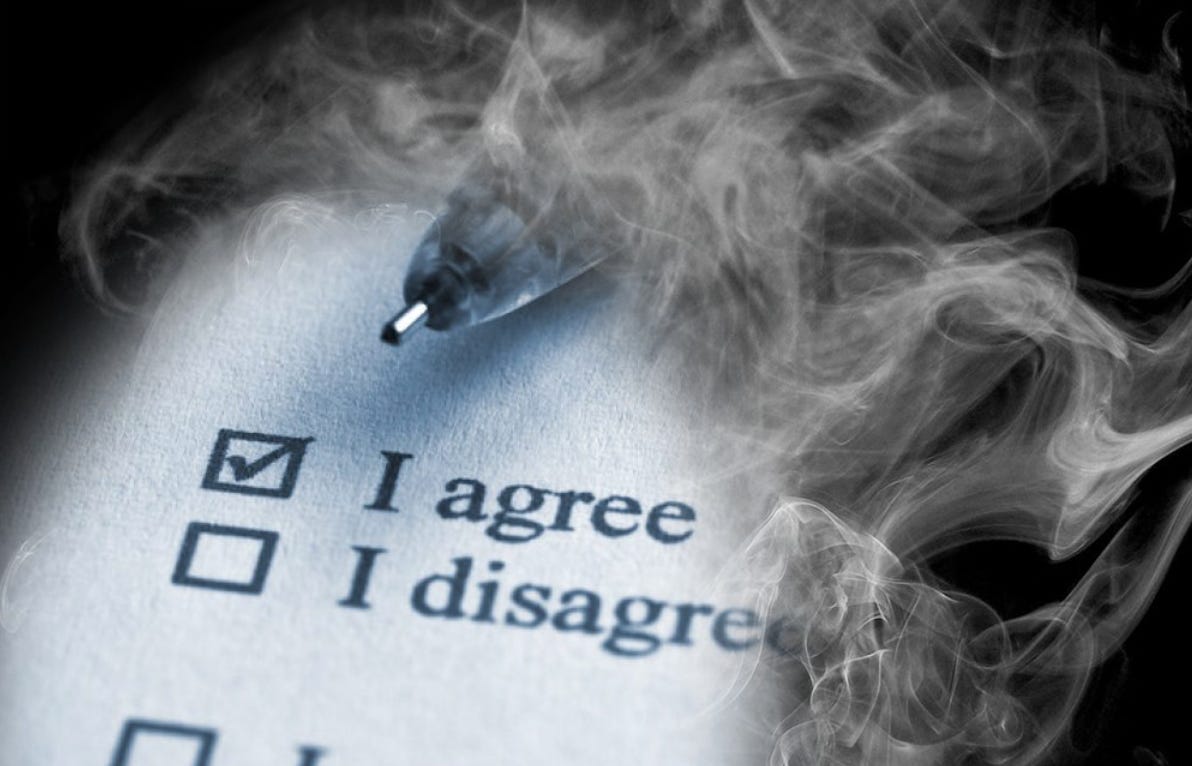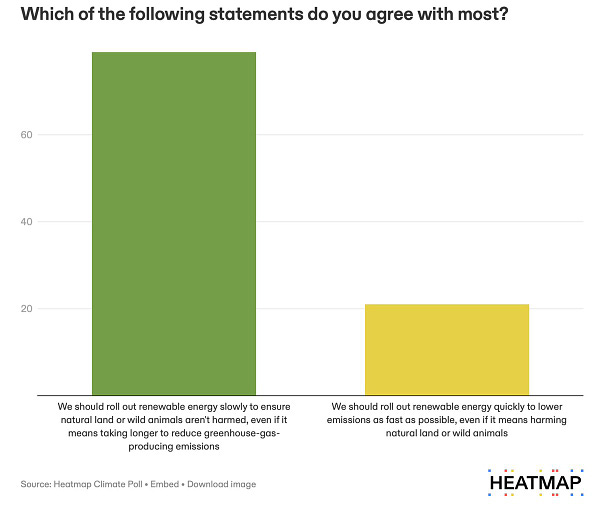HEATED - Poll-ution
Welcome back to HEATED! Emily here. Today’s newsletter is a special joint edition with climate journalist Amy Westervelt, who hosts the best true-crime climate podcast out there: Drilled. Check it out, will ya? Also, if you’ve been enjoying HEATED’s content lately, it would mean the world to us if you considered supporting us with a paid subscription. Our readers are our sole source of income, so each subscription really goes a long way to ensuring that our unique brand of climate reporting and analysis can continue. Poll-utionA recent poll reveals how tough it is to get an accurate read on public opinion about climate policy.Today’s article is a special joint edition with Drilled, journalist Amy Westervelt’s newsletter and podcast on fossil fuel industry climate delay. Drilled’s newest season, “Light, Sweet Crude,” is streaming on all your favorite podcast apps now. Ever since Nate Silver started 538, the allure of polling has been strong for journalists. Something about it seems somehow more objective than other sorts of reporting—even though anyone who’s read How to Lie with Statistics can tell you that polling data, like all data, can be easily manipulated. A recent poll published by one of our favorite new entrants to the climate media space, Heatmap, is a good example of where this approach can get complicated. On March 23, Heatmap published an article claiming that the vast majority of Americans believe that preserving local flora and fauna is more important than quickly building renewables to slow climate change—and that they are therefore on the side of fossil fuel-funded groups and others who are opposing renewable projects across the country.  Across the country, self-described environmentalists are fighting new wind and solar, claiming that they’ll damage local wildlife.
They’ve been accused of being fossil-fuel stooges. But our new poll finds that Americans are *overwhelmingly* on their side: To get these results, Heatmap asked 500 Americans to choose between two statements:
In the end, 79 percent of respondents agreed with statement number one, and only 21 percent agreed with statement number two.  When asked whether the US should build renewables ‘quickly’ so as to reduce carbon pollution as fast as possible, or roll out renewables ‘slowly’ so as to not harm local plants and animals, Americans — by a nearly 4-to-1 margin — want to go slow. heatmap.news/climate/protec… It was indeed a staggering result. But is the premise of the question really accurate? And do the results really mean that “most Americans” agree with fossil fuel-funded campaigns to kill renewable energy projects across the country? What critics say about the poll @robinsonmeyer As you know I appreciate your work, but this polling question is not exactly objective. Senator Brian Schatz (D-HI) was one of the first to raise questions about the poll, saying he didn’t believe it was accurate to force people to choose between harming wildlife and building renewables quickly. “It’s a false choice,” he told Drilled and HEATED in a statement. “Moving faster to literally save lives by preventing catastrophic drought, wildfires, and sea level rise does not mean we are harming animals or the land. We can and should protect our environment and move with the urgency the climate crisis demands.” Polling experts we spoke with were also skeptical with the question’s framing. “I have issues,” said Anthony Leiserowitz, director of the Yale Program on Climate Communication, which frequently runs polls on American attitudes toward climate change and renewables.
Dana Fisher, professor of sociology and director of the Program for Society and the Environment at the University of Maryland, also found the framing misleading because it presents only two options, both of which are confusing and leave important information out. “That question ‘Which of the statements do you agree to’ is just crazy,” she said. “Survey methods require that the questions be simple so the results can be interpreted easily, and these options are not simple at all! The whole ‘even if’ clause makes interpretation of the results very difficult.” Heatmap’s response to criticsDiscussing the criticism with HEATED and Drilled, Heatmap Executive Editor Robinson Meyer defended framing the question as a choice between “moving quickly and harming nature” and “moving slowly and not harming nature,” describing the debate as both typical and timely. “The question of whether we should speed up the process of deploying renewables — which means accelerating/skipping environmental review steps and increasing the chance of harming local plants and animals — is a live question in the current policy debate,” he said. (This is true; here are some examples). Meyer also noted that fossil fuel-funded groups aren’t the only ones who frame the debate around renewables in these terms. “Climate hawks, renewable lobbyists, conservation advocates, and journalists” frame the debate this way as well, and cited multiple examples. In addition, he said, Heatmap is the first group to try and gauge actual public opinion on this policy debate. Our takeAll of this is fair enough. And it is worthwhile to know that so many people, when given the option between conservation and reducing emissions quickly, chose conservation. But the way we see it, the results still don’t equate to sweeping public disapproval of quick renewable energy build-out. For that type of conclusion, the polling question would have needed to provide all the context necessary for that debate. It would have needed to connect greenhouse gas emissions to climate change; to mention the devastating effects of climate change on land and animals; and to mention that fossil fuel development is also harming nature, among so many other things. That kind of nuance, however, does not make for a snappy polling question. And this is the problem with polling on climate policy in general. It is almost impossible to simplify ongoing debates into two simple, forced-choice questions–at least not without leaving out important context. Other questions in Heatmap’s poll demonstrate this challenge. For example: in one question, respondents were asked to pick from a list of climate solutions they thought the federal government should embrace. Included in the list was the option of “Investing in technologies that greatly reduce greenhouse gas emissions: this can be renewable energy like solar or wind power, or technologies like carbon capture which reduce the amount of carbon dioxide already in the atmosphere.” At this point, not even oil companies would say that carbon capture “greatly reduces greenhouse gas emissions” or that it is on par with renewable energy. We want to be clear: our intention is not to shit on Heatmap. It’s a publication full of great reporters with demonstrated climate expertise, which is sorely needed in political media. And Heatmap certainly isn’t the first political outlet to ever draw sweeping conclusions about climate policy from an oversimplified poll; HEATED has also been guilty of this in the past. We do think, though, that as climate journalists and folks within the climate movement figure out how to respond to the growing wave of criticism around renewables—and they must, just ignoring or dismissing the criticism is not going to work—they need to proceed with caution. Because the fact is, fossil fuel interests are disingenuously co-opting the real concerns of conservationists, using the false argument that building out renewables quickly will definitely, irreparably harm the nature that surrounds it. And that’s just not necessarily true. There are real environmental impacts with renewables, particularly around mining for rare earth minerals. That’s why oversight and regulation of that mining is critical. As is looking at overall transportation, urban planning, and consumption patterns. If everyone replaces their combustion engine car with an electric SUV, for example, that’s not only probably not going to move the needle on climate change, but could actually move us backward, according to a study out earlier this year from the Climate and Community Project. None of those realities, however, mean that electrification is just as bad or worse than fossil fuels, which is how a lot of conservative pundits are framing it. Nor does it mean as Ted Cruz recently suggested, electrification will require child labor in mines, while fossil fuel drilling and refining have always been, and remain, perfectly safe for children. We’re at a pivotal moment in the energy transition, a moment in which the U.S. government could ensure that electrification doesn’t follow in the footsteps of the fossil fuel industry. But in the midst of a massive wave of disinformation about renewables, it’s incumbent on those of us who know better to avoid amplifying the false choices pushed by the fossil fuel industry, and engage instead in a thorough and honest conversation about the potential impacts of the industry and how to mitigate them. Catch of the Day: Today’s featured emotional relief animal comes to us via reader Donna. Want to see your furry (or non-furry!) friend in HEATED? It might take a little while—as you can see, we’re still posting pics sent to us in December! But we WILL get to yours eventually! Just send a picture and some words to catchoftheday@heated.world. You're currently a free subscriber to HEATED. For the full experience, upgrade your subscription. |
Older messages
Biden's climate f*ckboy behavior
Friday, March 31, 2023
The president's excuses for approving the Willow project are just that: excuses. You deserve someone who will give you the world.
Stacey Abrams wants YOU (to go electric)
Friday, March 24, 2023
Listen now (23 min) | In an interview with HEATED, the Democratic star talks about her move away from elections, and into electrification.
The IPCC makes it clear: fossil fuels must go
Tuesday, March 21, 2023
Averting dangerous warming requires “a substantial reduction in overall fossil fuel use," the world's leading climate scientists said Monday.
The truth about Big Toilet Paper
Friday, March 17, 2023
Are the fat cats at Charmin waging a secret campaign to prevent the widespread adoption of bidets?
Willow is not just an “environmentalist” concern
Thursday, March 16, 2023
HEATED analyzed 30 national news stories about the Willow project and found that 75 percent framed its importance as primarily political.
You Might Also Like
Meghan Markle Nailed The Easy Spring Outfit Of Our Dreams
Thursday, March 6, 2025
She met up with Serena Williams for a casual lunch date. The Zoe Report Daily The Zoe Report 3.5.2025 Meghan Markle Nailed The Easy Spring Outfit Of Our Dreams (Celebrity) Meghan Markle Nailed The Easy
What I Learned From a 30-Minute Recomp Workout
Wednesday, March 5, 2025
View in Browser Men's Health SHOP MVP EXCLUSIVES SUBSCRIBE What I Learned From a 30-Minute Recomp Workout What I Learned From a 30-Minute Recomp Workout Dr. Pat Davidson's 'Double-Deuce
What People Are Getting Wrong: Measles Myths
Wednesday, March 5, 2025
3 Roth IRA Rules to Know During Tax Season. It turns out that hosting "measles parties" is a bad idea. Not displaying correctly? View this newsletter online. TODAY'S FEATURED STORY What
‘My Friends Abandoned Me When They Had Kids’
Wednesday, March 5, 2025
Today in style, self, culture, and power. The Cut March 5, 2025 ADVICE 'My Friends Abandoned Me When They Had Kids' You need to pick one or two friendships and fight for them. The rest are
Sydney Sweeney Wore A Super Sparkly Dress With Cutouts After The Oscars
Wednesday, March 5, 2025
Plus, the hilarious Chelsea Handler, your daily horoscope, and more. Mar. 5, 2025 Bustle Daily Chelsea Handler shares four of her favorite books. Bustle ONE NIGHTSTAND Why Chelsea Handler Has No
The ultimate guide to instant noodles
Wednesday, March 5, 2025
Inside the closure of LA institution The Original Pantry Cafe
Save the Date for Poetry & the Creative Mind
Wednesday, March 5, 2025
Thursday, April 24, 2025 View this email in your browser Twitter Facebook Website Copyright © 2025 The Academy of American Poets, All rights reserved. You are receiving this email because you opted in
Is This The Best Serum For Dark Spots Yet?
Wednesday, March 5, 2025
According to Clinique, yes. Mar. 5, 2025 Bustle Daily Clinique's New Clinical Dark Spot Serum Is A New Era In Even Skin Presented by Clinique Clinique's New Clinical Dark Spot Serum Is A New
Win the ultimate bedroom makeover! Enter now!
Wednesday, March 5, 2025
The Sleep More Sweepstakes
Urbanism And Lent
Wednesday, March 5, 2025
Pleasurable things can also be constructive ͏ ͏ ͏ ͏ ͏ ͏ ͏ ͏ ͏ ͏ ͏ ͏ ͏ ͏ ͏ ͏ ͏ ͏ ͏ ͏ ͏ ͏ ͏ ͏ ͏ ͏ ͏ ͏ ͏ ͏ ͏ ͏ ͏ ͏ ͏ ͏ ͏ ͏ ͏ ͏ ͏ ͏ ͏ ͏ ͏ ͏ ͏ ͏ ͏ ͏ ͏ ͏ ͏ ͏ ͏ ͏ ͏ ͏ ͏ ͏ ͏ ͏ ͏ ͏ ͏ ͏ ͏ ͏ ͏ ͏ ͏ ͏ ͏ ͏ ͏ ͏ ͏ ͏ ͏




